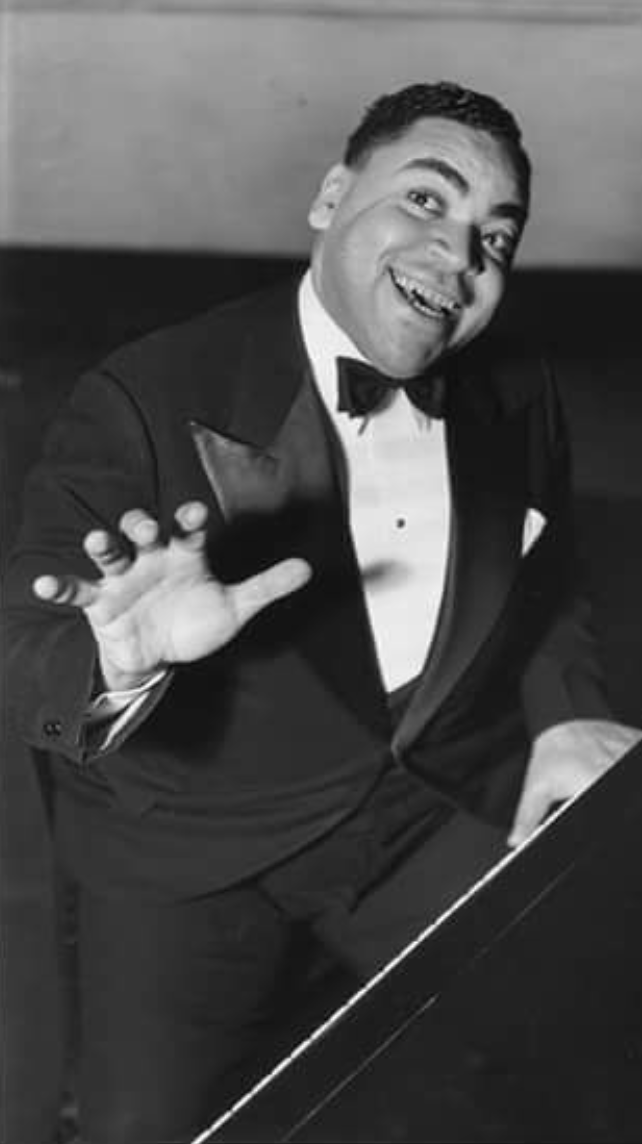Thomas Wright (“Fats”) Waller grew up in a Harlem household where his father was a Baptist preacher and his mother played piano and organ. He took up the piano at age six, playing in a school orchestra led by Edgar Sampson. After his mother died when he was 14, Waller moved into the home of pianist Russell Brooks, where he met and studied with James P. Johnson, Carl Bohm, and the famous pianist Leopold Godowsky. Waller made his first record at age 18, “Birmingham Blues”/Muscle Shoals Blues” in 1922.
He backed various blues singers and worked as house pianist and organist at rent parties and in movie theatres and clubs. He began to attract attention as a composer at this time, forming a most fruitful alliance with lyricist Andy Razaf that resulted in three Broadway shows in the late ’20s, “Keep Shufflin’,” “Load of Coal,” and “Hot Chocolates.” Waller’s most significant early records for Victor were a series of brilliant 1929 solo piano sides of his own compositions like “Handful of Keys” and “Smashing Thirds.” After finally signing an exclusive Victor contract in 1934, he began the long-running, prolific series of records with his Rhythm, which won him great fame and produced several hits, including “Your Feet’s Too Big,” “The Joint Is Jumpin’,” and “I’m Gonna Sit Right Down and Write Myself a Letter.”
He began to appear in films like “Hooray for Love” and “King of Burlesque” in 1935 while continuing regular appearances on radio dating back to 1923. He toured Europe in 1938, made organ recordings in London for HMV, and appeared on one of the first television broadcasts. Well aware of the popularity of big bands in the 1930s, Waller tried to form his own, but they were short-lived. Into the 1940s, Waller’s touring schedule of the U.S. escalated; he contributed music to the films (including a memorable stretch of Stormy Weather where he led an all-star band that included Benny Carter, Slam Stewart, and Zutty Singleton).
As a composer and improviser, his melodic invention rarely flagged, and he contributed fistfuls of joyous yet paradoxically winsome songs like “Honeysuckle Rose,” “Ain’t Misbehavin’,” “Keepin’ Out of Mischief Now,” “Blue Turning Grey Over You” and the extraordinary “Jitterbug Waltz” to the jazz repertoire. While every clown longs to play Hamlet, as per the cliché, Waller did have so-called serious musical pretensions, longing to follow in George Gershwin’s footsteps and compose concert music. It was not to be, due to the racial barriers of the first half of the 20th century.
Waller influenced a long line of pianists, including Count Basie, Teddy Wilson, Art Tatum, Thelonious Monk, Dave Brubeck, and countless others. His impact has been truly profound. Years of draining alimony squabbles, plus overindulgence, and, no doubt, frustration over not being taken more seriously as an artist began to wear him down. Waller was returning to New York City from Los Angeles, after the smash success of Stormy Weather, and after a successful engagement at the Zanzibar Room, in Santa Monica California, during which he had fallen ill. the Santa Fe Chief train for the long trip back to New York. He never made it, dying of pneumonia aboard the train during a stop at Union Station in Kansas City on December 15, 1943.
More than 4,000 people attended his funeral in Harlem, which prompted Dr. Adam Clayton Powell Jr., who delivered the eulogy, to say that Fats Waller “always played to a packed house.” Afterwards he was cremated and his ashes were scattered, from an airplane piloted by an unidentified World War I black aviator, over Harlem. One of his surviving relatives is former Georgia Tech Yellow Jacket and current Baltimore Ravens tight end Darren Waller, who is Fats’ paternal great-grandson.
Written by Dianne Washington

